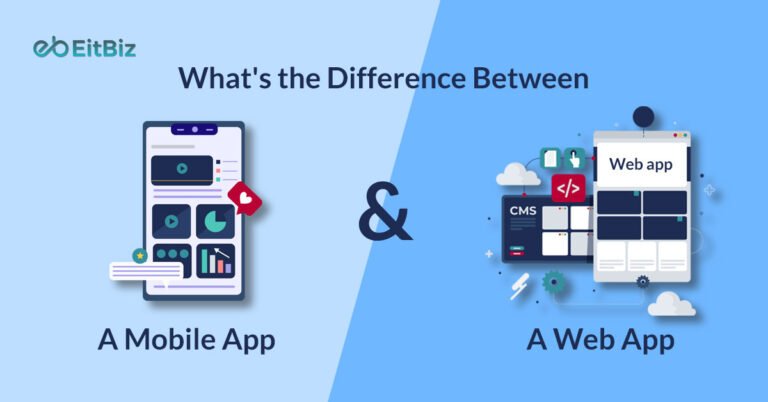When we hear the word “App”, the first thing that strikes the doors of our mind is “Mobile App”!
Even the stats don’t lie!
As per the recent statistics, nearly 4 trillion hours are spent on mobile apps just a couple of years ago!
Though mobile apps are incredibly important, web apps have also started gaining traction in the realm of app development.
The fact of the matter is that many people have a misconception that web and mobile apps are the same thing, but in reality, the scenario is somewhat different. In layman’s language, the former runs on desktop while the latter runs on mobile!
But is the difference enough to understand?
Well, exactly not!
That’s the reason, this post will guide you on the battle between web app vs mobile app to foster a better business decision.
Let’s start with mobile apps!
Understanding Mobile Applications
Mobile apps are dedicated software applications that are built and designed to run on specific devices like smartphones, tablets, and more. A user can simply download a mobile app via Play Store (Android) & App Store (iOS).
Unlike web apps which can be browsed via any browser on a desktop, mobile apps can only be installed on mobile.
Speaking of popularity, mobile apps have an edge over web apps! Let’s understand how!
- According to Statista, more than 254 billion downloads on Google & iOS platforms in 2022.
- Most Android users spend 90% of their time using apps
- The number of smartphone users is expected to reach about 7.6 billion by 2027.
These numbers show the promising future of mobile apps, showing no signs of slowing down!
Before we dive into the comparison of a web app vs a mobile app, let’s find out the different types of mobile apps.
Different Types of Mobile Apps
Here is a list of the types of mobile apps.
1. Native Apps
These types of apps are designed to be used on a specific platform or device, either iOS or Android. The key highlight of these apps is that they are performance-oriented and may foster a seamless user experience. Since each app is written in a specific code, the iOS apps are built in Objective C or Swift while Android apps use Java.
2. Hybrid Apps
Unlike Native apps, hybrid apps include those mobile apps that can easily run on any platform, be it Android or iOS. The best part is that these apps have access to the native APIs and it allows the developers to use the same code to build the app for a different platform.
3. Mobile Web
These kinds of apps can be browsed via the browser on the mobile. Since these mobile apps are designed with keeping quick reload in mind, they are faster and can be opened in just a fraction of a second. These apps are designed for users who do not want to install a separate mobile app.
Benefits of Building Mobile Apps
In a comparison of a web app vs a mobile app, both come with their own set of advantages. Let’s discuss the benefits of mobile apps.
- Enhanced Personalization
The key benefit of building mobile apps is that these apps foster communication between your business and the customers, influenced by the browsing history and buying behavior of the person. Because users will have to sign in to use your app, the app can easily track where your users go, what they click the most, and recommend new products and services based on their app usage.
- Push Notification & Updates
In comparison between a web app vs a mobile app, mobile apps enable you to send push notifications to the user and instant updates on the latest offers and deals on specific products and services. It is no secret that push notifications are an ideal way to reach out to your customers and engage them in real-time.
- Users Spend More Time on App
It comes as no surprise that users spend most of their time on apps. Just imagine- How many people you have seen consuming desktop content? Well, you have got the answer in your mind! If you want to enjoy 2X or 3X business growth, then building the right mobile apps is incredibly important.
After understanding the meaning of mobile apps, it’s time to set your sights on web apps!
Web Apps: What are they?
In the debate of a web app vs a mobile app, a web app is another important element that has been transforming the realm of app development. Web apps are dedicated apps designed to work on desktops and laptops. The key highlight of these apps is that they don’t need to be downloaded and can easily be accessed via the Internet browser.
The major difference between mobile and web apps is that a web app displays the content without giving room for interaction. The ideal purpose of the website is to showcase static content to the user, for example, a brand website, portfolio, image, and more.
Just like mobile apps, the growth of web apps looks promising!
- According to a report by Statista, the global market for web application development is projected to reach $179.90bn in 2024.
- Modern tech stack and frameworks like React Native, Angular, & Vue.
- Web apps are likely to be the customers’ #1 priority to engage with.
Types of Web Apps
Though there are many web apps, we’ve jotted down some of the popular web apps.
1. Static Web Apps
These are the simplest forms of web apps that are designed for creating digital brochures or portfolios. If you are a small business owner or a startup looking for a cost-effective solution, then these static web apps are a solution. Since the web app is static, as the name suggests, the content won’t change until it’s changed by the developer.
2. Dynamic Web Apps
Unlike static web apps, these apps provide personalized experiences to the user based on their past interactions and preferences. If you are a business looking to prioritize user engagement and variation in content, then building dynamic web apps is an ideal solution.
3. Single Page Apps
These kinds of apps run within the browser and do not app page to be reloaded again and again. Unlike conventional web apps, single-page web apps are faster in nature and can be loaded in a few seconds. When it comes to a web app vs a mobile app, these single-page apps are widely popular.
4. Multi-Page Web Applications
In simple terms, multi-page web apps include multiple pages and reload the entire page whenever a user switches to a different page of the app. Examples of multi-page web apps include Google Docs, Trello, and more.
5. Progressive Web Apps
A blend of a regular web page or a mobile app, PWAs can be installed easily on a desktop and offer a wide range of features, including offline functionality, background data syncing, push notifications, and more. With enhanced performance and smooth animations, PWAs stand as an ideal web app for businesses of all sizes.
Advantages of Web Apps for Your Business
Here is a list of the potential benefits of considering web apps for your business.
- Enhanced User Experience
One of the key advantages of web apps is that they offer an intuitive and seamless user experience to customers. Since these apps are 24/7 accessible, users can interact with web applications quite easily. Furthermore, these apps can easily integrate new custom features and functionality to meet evolving users’ needs.
- Improved Security Aspect
Since web apps store information on remote services, you can simply access your confidential data with just a username and password. With a web-based app, you can rest assured that even if your desktop gets damaged, you can simply log in with your credentials on another laptop/desktop. Even if there is a loss of data, it can easily be restored from the cloud.
- Quick Installation & Maintenance
When you use a dedicated web app, you don’t need to worry about memory usage. The best part is that you can easily run your web apps on older devices without meeting specific requirements. Furthermore, the installation time of web apps is relatively faster and they don’t require any specialized maintenance every month.
Web App vs Mobile App: Understanding the Key Differences Between the Two
Let’s take a look at the differences between a web app and a mobile app based on the following parameters.
| Parameters | Web App | Mobile App |
| Accessibility | These apps are accessible on browsers. | These apps need to be downloaded via an app store. |
| Functionalities | Web apps do not support complex functionalities. | Mobile apps, on the other hand, offer flexible user interfaces and easily support complex functionalities. |
| Updates | Regular updates are applied to the web apps without any difficulty. | To update mobile apps, patches and updates need to be downloaded from the Play Store. |
| Coding | There is no need for the developer to take care of the code. | Under mobile apps, developers need to write extensive code for a specific device or platform. |
| Monetization | When it comes to monetizing aspect, it is relatively simpler in web apps. | Mobile apps, on the other hand, still need to create a systematic monetization strategy. |
| Development Cost | The development cost of web apps is quite low compared to mobile apps. | In the battle of a web app vs a mobile app, there’s a huge cost associated with mobile apps. |
| Speed | The speed of a web app depends on the Internet quality. | Though the mobile apps need installation, they give faster navigation with quicker load times. |
Who is the Winner between a Web App vs a Mobile App?
So, that’s a wrap to the debate between a web app vs a mobile app! It is no secret that both web and mobile apps offer a seamless experience to the user. But it can only be possible if you know how to reach your target audience.
To summarize, if you want to build an app with enhanced features, security, and easy to install on a smartphone, then mobile apps are an ideal solution. On the other hand, if you want less complexity and faster speed, then choosing web apps is a better choice.
Ready to build a dedicated mobile or web app? If so, look no further than EitBiz!
We are a leading web and mobile app development company that has a proven track record of building 1000+ mobile and web apps for different industry verticals. Backed by the latest technology and a team of certified app developers, we may convert your app idea into reality without breaking the budget.
To discuss your requirements, call us today at +1(812)530-6300 or you can mail us at info@eitbiz.com today!







